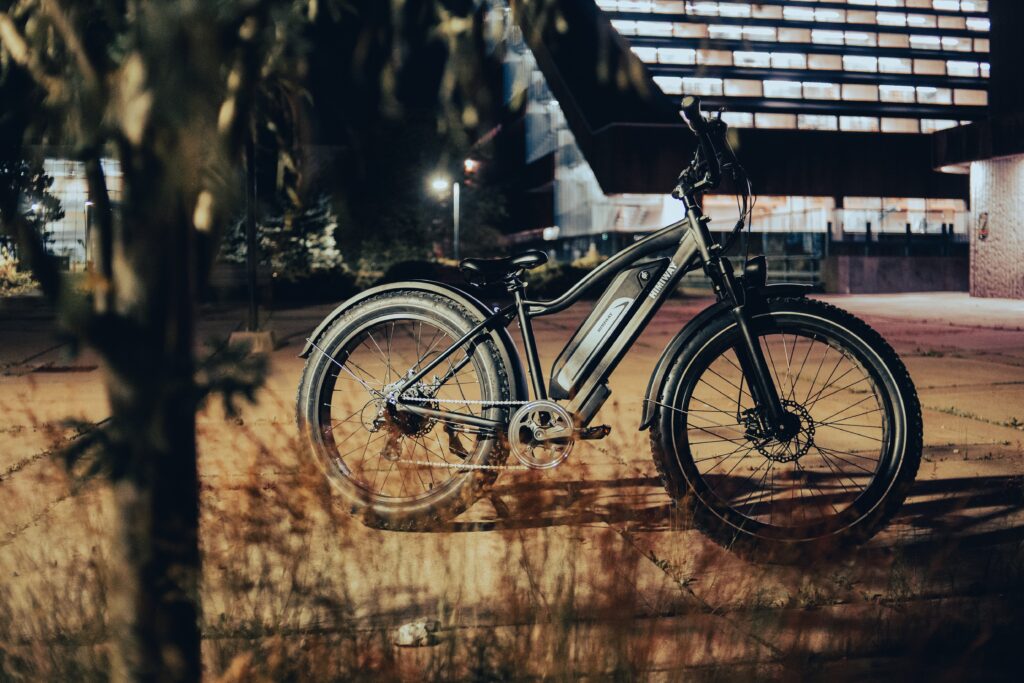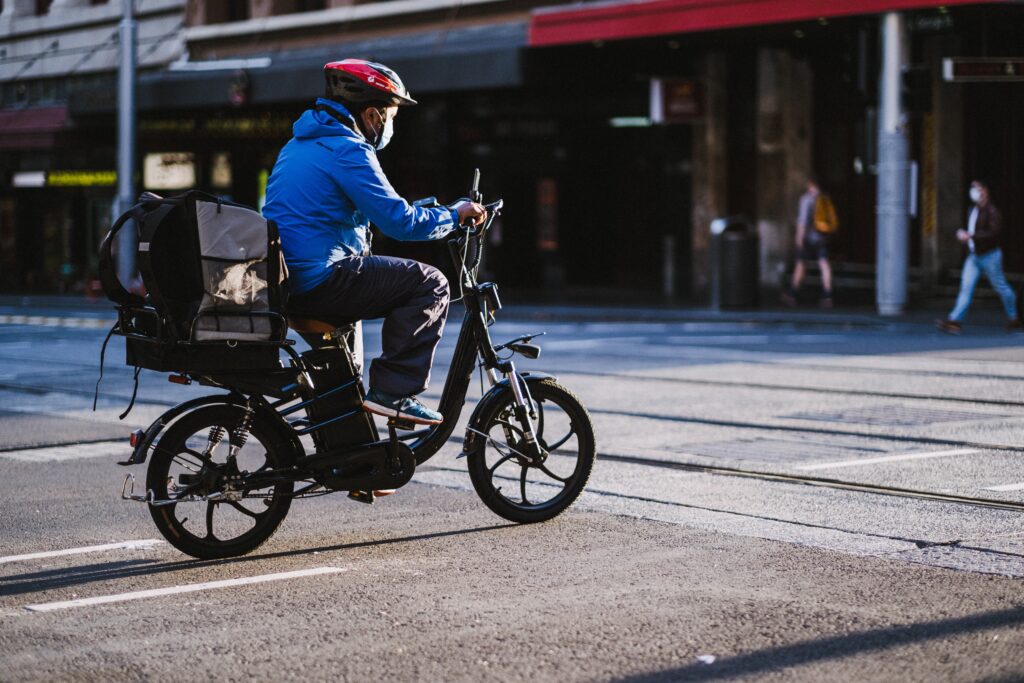An electric bike has extra components that make it heavier than a regular bike. The weight of an electric bike is important as it makes a difference in how fast it can go, its maneuverability, and its range.
So how much does an electric bike weigh? Generally, an electric bike weighs between 18 and 36kg. However, the weight is affected by the type of bike it is, the battery capacity, the size of the motor, and what it’s made from.
What Affects An Electric Bike’s Weight?
The Motor And Battery System
An electric bike’s battery weighs between 5 and 10kg. If you want a more accurate figure, you can expect a 48V 15A battery to weigh around 5kg. On average, electric bike motors weigh approximately 4.5 to 5kg and are mounted in a wheel hub or between the cranks.
The more powerful the motor and the more capacity the battery has, the heavier the bike will be. As long as the motor and battery are paired correctly, the further, you will be able to ride before charging.
Frame And Components
Extra weight also comes from the bike’s need to cope with the demands of riding with electrical power.
Therefore, you can expect your electric bike to have a chunkier frame than a regular bike. But its frame material will also affect how much the bike weighs.
Like regular bikes, electric bike frames are usually made from aluminum or carbon fibre. Aluminum bikes are less expensive but heavier than those with carbon fibre frames.
Electric bikes also have more robust components to deal with the stresses from the motor.
For example, electric bikes have stronger brakes, over engineered suspension, and wider wheels with tough tyres. These more hardy components also add to the electric bike’s weight, but they will last longer and be safer.
Electric Bike Weight Sample
Here is an example of how different electric bikes weigh in the table below. Remember, the weight might vary slightly depending on what add ons or modifications you use, as well as the specifications when purchased from the manufacturer. In our experience, one of the defining aspects in terms of weight in the battery. If you go for a bigger, better battery with more juice, the weight of the electric bike will increase.
| Electric Bike Model | Weight (lbs) |
|---|---|
| Rad Power Bikes – RadRover 5 | 69 |
| Trek – Allant+ 7 | 51.8 |
| Specialized – Turbo Vado 4.0 | 48.9 |
| Giant – Quick-E+ | 50.7 |
| Pedego – City Commuter | 58 |
| Cannondale – Tesoro Neo X 2 | 48.1 |
| Juiced Bikes – CrossCurrent S2 | 56.2 |
| Brompton – Electric Folding Bike | 36.6 |
Which Is Best Heavier Or Lighter?
If you were buying a regular bike, going as lightweight as possible is best. This is because lighter bikes are easier to pedal and control. But, lightness isn’t always the best characteristic of an electric bike.
To make an electric bike lighter, the manufacturer would have to compromise on the motor and battery size. A smaller battery will mean that you can’t ride as far before you need to charge.
However, battery and motor technology is improving rapidly. Therefore, you can expect lighter and smaller items with similar outputs to their heavier counterparts. Although, you’ll have to pay a premium.
Before buying an electric bike, you should consider what you want to use it for. If you want to use your electric bike for short commutes or exercise, you would be better off with a lightweight bike. This is because having a powerful motor and a large battery is not a primary concern unless you live in an area with lots of steep hills or need to carry cargo.
But if you need an electric bike with a powerful motor, your electric bike will be heavier. The benefit of larger motors is that they also produce lots of torque, making the bike accelerate faster, climb hills and carry more weight.
But if you had a high-torque motor on a lightweight electric bike, it could actually deform the frame. Therefore, a bike suitable for riding off-road, carrying cargo, or long distances requires a bulkier and heavier frame to deal with the pressure.

How Does The Weight Of An Electric bike Affect The Rider?
The assistance from the motor and battery means that it’s much easier to maintain your speed once you get going. Therefore, in a straight line, you won’t feel the weight; in fact, the weight contributes to the momentum you have built up.
Most electric bike riders get used to the extra weight pretty quickly. But they need to learn how to manoeuvre the bike around tight spaces, as it’s a little more challenging than on a regular bike.
Where the motor is mounted affects how the bike handles. For example, an electric bike with a mid-mounted motor has predictable handling, as it has a low centre of gravity and even weight distribution.
On the other hand, a bike with a hub-mounted motor has more weight on the rear wheel. Therefore, these bikes aren’t the best choice for riding technical mountain bike terrain. But they are perfectly fine for urban riding and commuting.
It’s a good idea to ask the question, “how much does an electric bike weigh?” when it comes to learning what they’re like to live with. The weight of an electric bike makes a difference to the ownership experience.
Also, with more weight in general, there’s more stress on the tires which could potentially lead to a puncture. When riding a heavier electric bike you need to pay a bit more attention to tire care.
They require more effort to hold upright than regular bikes, which is a consideration if you’re not particularly strong. Also, if you need to carry your electric bike upstairs regularly or put it on a bike rack, you should look for a lightweight electric bike.
It’s essential to know how much your electric bike weighs and feels, so you can manage it and live with it safely. You can choose a lightweight electric bike, but you need to ensure that it has a sufficient range for your needs. Some people try to extend their range with an extra battery; however, they still carry the extra weight, just in a backpack. Therefore, it’s often better to buy an electric bike with a higher capacity battery.
Types Of Electric Bikes Based On Weight
There’s an electric bike for everyone’s needs these days, and the type will dictate how heavy the electric bike will be. If you want to ride as fast as possible, you’ll need a lighter bike. But if you want to ride your electric bike off-road or it to be a workhorse, you should expect it to need something significantly heavier.
But when it comes to speed, you should be aware that all electric bikes have a limited assisted top speed. You can ride faster than the limited top speed, but the motor cuts off, so you’re doing all the work, which is where a lightweight bike comes in handy.
Here’s a rundown of the types of electric bikes and how heavy they are. This should help you decide which electric bike is best for you based on weight.
Folding Electric Bikes
Folding electric bikes are built to be portable and for easy storage. You can commute with them or carry them in your car. They are pretty versatile, so they’re great for day-to-day use or for weekends away.
The weight of a folding electric bike depends on its design and components. You can get mini folding electric bikes that weigh 13 to 18kg, which is the easiest to carry. If you want something a little more rugged, a folding mountain bike weighs 18 to 31kg, but a typical folding fat tyre bike weighs in at 50kg.

Commuter Electric Bikes
Commuter electric bikes are also known as hybrids. They’re comfortable and efficient to ride around town. They have characteristics of both road and mountain bikes, and you can buy ones with larger batteries for riding longer distances.
Larger batteries add to the bike’s weight, but you can expect an electric commuter bike to weigh between 22 and 31kg.
Electric Road Bikes
Electric road bikes are built for speed and are as light as possible. They have the trademark road bike dropped handlebars for an aerodynamic riding position. However, their frames are a little beefier to accommodate the battery and motor, increasing their weight.
The lightest electric road bikes weigh about 18kg, but the weight will increase depending on the motor and battery combo.
Electric Mountain Bikes
As you’d expect, an electric mountain bike is heavier than a road or commuter bike. Their components need to be more robust to cope with the demands of technical off-road riding.
Electric mountain bikes tend to weigh between 18 and 32kg. But typically, you should expect most electric mountain bikes to be at the heavier end of the range.
Fat tyre electric mountain bikes need more power to cope with the tyre’s extra width and the riding style. So along with the more rugged components, wider wheels, heavy-duty frame and power system, these bikes tip the scales at 27 to 36kg.
Electric Cruisers
Electric cruiser bikes are designed for comfort and to make life easy. They’re lifestyle vehicles, so many have a throttle mode, so you don’t have to pedal at all. This means they need to be powerful, especially if you ride in hilly areas or like to load up the cargo rack.
The heavy motor and battery combination, combined with a large, plush saddle, gives electric cruiser bikes an average weight of about 32kg.
The Weight Can Be Different In The Rain
Water weighs a lot, and if you’re riding in wet whether and your bike is picking up a lot of water it may further affect the handling. We know in general that electric bikes can get wet but it’s worth remembering that riding in the rain can be a lot harder and if the bike already weights more, cycling on an electric bike in the rain can be trickier than doing so on a normal bike.

How Much Does An Electric Bike Weigh? – Answered!
As you can see, a few variables make a difference in how much an electric bike weighs. You’ll probably know which type of electric bike you want, so you now have some parameters to work with.
You need to consider what is more important to you regarding power, range, weight and budget. There will always be a compromise, but striking a balance between the main characteristics is possible.

